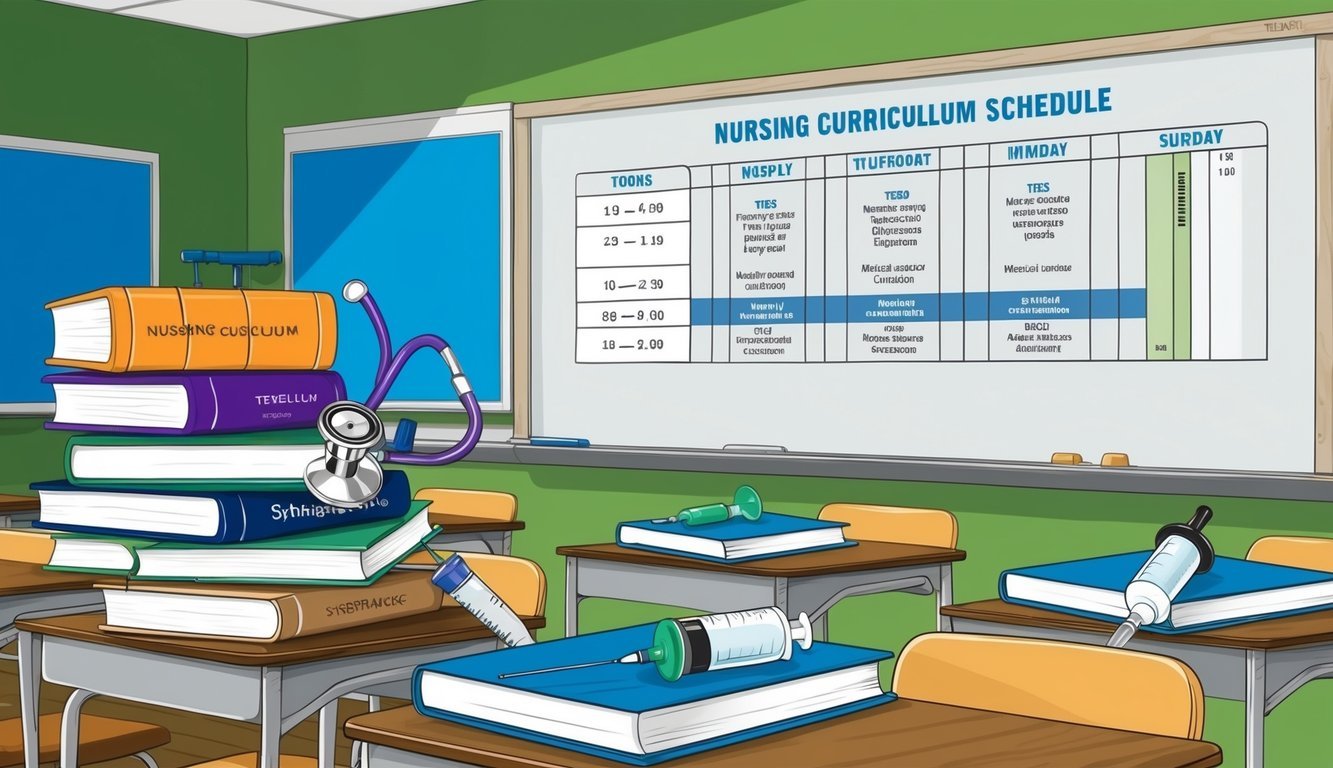Accelerated nursing programs offer a fast track for individuals seeking to become registered nurses.
Typically, you need to hold a bachelor’s degree in another field, complete specific prerequisite courses, and demonstrate a strong academic background.
These programs can greatly shorten the time required to earn your nursing degree, often allowing you to graduate in just 11 to 18 months.
When considering an accelerated nursing program, it’s essential to understand the key elements that influence your path.
These include understanding admission requirements, knowing how to finance your education, and ensuring that the program is accredited.
By carefully preparing for these aspects, you can enhance your chances of success in this challenging yet rewarding field.
As you explore your options, consider how each accelerated nursing program fits your career goals and lifestyle.
With the right preparation and commitment, you can transition into a fulfilling nursing career more quickly than traditional routes allow.
Key Takeaways
- Accelerated nursing programs require a bachelor’s degree and specific prerequisites.
- Understanding the financial aspects can help you plan your education effectively.
- Ensuring that your program is accredited is crucial for future licensure.
Understanding Accelerated BSN Programs
Accelerated BSN programs offer a fast-track option for individuals who already hold a bachelor’s degree in a non-nursing field.
These programs equip you with the skills and knowledge needed to become a registered nurse in a reduced time frame.
This section outlines what an accelerated BSN is, its advantages, and the job outlook for registered nurses.
Defining Accelerated BSN
An Accelerated Bachelor of Science in Nursing (ABSN) program is designed for students who already have a previous degree.
These programs typically take 11 to 18 months to complete, far shorter than traditional BSN programs that last about four years.
Prerequisites may include courses in biology, chemistry, and psychology.
Upon completion, you earn a BSN and can sit for the NCLEX-RN exam to become a registered nurse.
Many universities offer these programs across the country, making it easier for you to find a suitable one.
For more details, consider this complete guide to accelerated nursing programs.
Advantages of an Accelerated Path
Choosing an accelerated path to a BSN has several benefits:
- Time Efficiency: Complete your degree in less than two years.
- Strong Demand: The nursing industry faces a significant shortage, increasing job opportunities.
- Higher Earning Potential: Registered nurses earn a competitive salary, averaging around $89,000 annually.
Additionally, these programs are rigorous.
Expect a demanding course schedule with hands-on clinical experiences.
This prepares you for the challenges of a nursing career in a real-world setting.
Financial aid options are typically available, including scholarships and grants.
Most programs advise against working while enrolled due to the intense workload.
Job Outlook for Registered Nurses
The demand for nurses remains strong, with the U.S. Bureau of Labor Statistics projecting a 9% growth in employment for registered nurses over the next decade.
This growth is driven by several factors:
- An aging population requiring increased medical care.
- Advances in healthcare that lead to new nursing roles, including those in specialized areas.
- Ongoing public health challenges.
As you enter the nursing field, opportunities may also arise in advanced practice roles, including nurse practitioners and nurse anesthetists.
This diverse range of possibilities allows you to tailor your nursing career to your interests and skills.
For further insights on job outlooks, you can visit this nursing career overview.
Prerequisites and Admission Requirements
Before you apply to an accelerated nursing program, it is essential to understand the prerequisites and admission requirements.
These criteria vary by institution but generally focus on your educational background and specific eligibility standards.
Typical Eligibility Criteria
To qualify for most accelerated nursing programs, you need to meet certain eligibility criteria.
Common requirements include:
- Cumulative GPA: Most programs require a minimum undergraduate GPA, often around 3.0 or higher.
- Prerequisite Courses: You may need to complete specific courses, such as biology, chemistry, and psychology, usually with a minimum grade. For example, some programs require at least 22 credit hours of these courses.
- Application Materials: Be prepared to submit your undergraduate transcripts, letters of recommendation, and a personal statement outlining your motivation for entering the nursing field.
Each program may have additional requirements, so check with individual institutions for their specific guidelines.
For detailed information, see this guide to accelerated nursing programs.
Required Educational Background
Your educational background is crucial for admission into an accelerated nursing program.
You typically need a non-nursing bachelor’s degree.
Here are some important points to remember:
- Degree Type: A degree in any field is usually accepted, but the higher your GPA, the better your chances.
- Prerequisites: Completing prerequisite courses is often necessary for eligibility. Institutions may require completion with a minimum grade.
- Program Specifics: Some schools might have unique requirements based on their curriculum or focus.
Make sure to research individual programs, as they may have specific admission preferences.
For more details, check the admissions requirements for an ABSN program.
Key Components of Accelerated Nursing Education

Accelerated nursing programs offer a fast track to becoming a registered nurse.
They emphasize a comprehensive curriculum, hands-on experiences, and practical skills necessary for nursing practice.
Rigorous Curriculum and Coursework
Your coursework in an accelerated nursing program will be intense and fast-paced.
You will cover essential subjects such as nursing fundamentals, health assessment, and evidence-based practice within a short time frame.
Classes typically include both theoretical and practical components, allowing you to integrate knowledge with real-world applications.
Expect to engage in collaborative projects and critical thinking exercises.
Many programs, like the Accelerated Bachelor of Science in Nursing, require completion of about 120 credits.
This includes mandatory prerequisites that set a strong foundation for advanced nursing topics.
Clinical Rotations and Experience
Clinical rotations are a crucial part of your training.
They allow you to apply what you’ve learned in the classroom to real patient care settings.
During these rotations, you will work in various healthcare facilities, including hospitals, clinics, and community health centers.
Typically, you will complete several rotations in different nursing specialties.
This experience helps you explore areas like pediatrics, geriatrics, and emergency nursing.
You will also learn to work as part of a healthcare team, improving your communication and collaboration skills.
Hands-On Skill Development
Hands-on skill development is vital in preparing you for nursing practice.
Most programs provide access to nursing labs where you can practice essential skills, such as patient assessments, administering medications, and performing basic procedures.
In addition to lab work, simulation experiences are often included.
Here, you will engage in realistic patient scenarios, allowing you to build confidence and competence before working with actual patients.
Through these activities, you will gain invaluable insights into community and public health nursing, focusing on patient care and advocacy within diverse populations.
Financial Considerations and Support

Understanding the costs of accelerated nursing programs is crucial, as well as the financial aid options available to help manage these expenses.
This section covers key information about program costs and ways to support your education financially.
Understanding Program Costs
Accelerated nursing programs can vary significantly in cost.
Tuition can range from $20,000 to over $50,000, depending on the institution and program length.
Here’s a quick breakdown of potential costs:
| Program Type | Estimated Tuition Cost |
|---|---|
| Accelerated BSN | $20,000 – $40,000 |
| Accelerated MSN | $25,000 – $50,000 |
| School Fees | $500 – $2,000 |
| Supplies/Books | $1,000 – $2,500 |
In addition to tuition, consider other expenses like transportation and housing.
You should create a budget to understand your financial situation better and prepare for these costs.
Financial Aid and Scholarships
Many financial aid options can help reduce your costs.
Federal student aid, such as Pell Grants and federal loans, is typically available.
You can fill out the Free Application for Federal Student Aid (FAFSA) to determine your eligibility.
Scholarships specifically for nursing students are also available.
These can range from small awards to significant tuition coverage.
Various organizations and schools offer scholarships, so research options thoroughly.
Some examples include:
- AACN Scholarships: Offered by the American Association of Colleges of Nursing.
- State Nursing Scholarships: Specific to your state of residency.
Utilizing these resources can ease the financial burden and help you focus on your studies.
Accreditation and Licensure
Understanding the importance of accreditation and the steps for licensure is crucial for your journey through nursing education.
Accredited programs meet specific standards that prepare you for the nursing profession, while licensure ensures you are qualified to practice as a registered nurse.
Importance of Accredited Nursing Programs
Accreditation is essential for any nursing program you consider.
Programs accredited by respected agencies like the Commission on Collegiate Nursing Education (CCNE) and the Accreditation Commission for Education in Nursing (ACEN) ensure that the education you receive meets industry standards.
When you graduate from an accredited program, you are eligible to take the NCLEX-RN exam, which is required for licensure.
The NCLEX pass rate is a key indicator of a program’s quality, reflecting success in preparing students for this challenging exam.
A strong pass rate can enhance your employability and show future employers that you completed a rigorous program.
Preparing for RN Licensure
To obtain your nursing license, you must first complete an accredited nursing program.
After graduation, you must pass the NCLEX-RN exam.
Familiarizing yourself with the exam format and content is vital to your success.
Study resources, review courses, and practice tests can strengthen your exam preparation.
Many programs offer support to help ensure a high NCLEX pass rate among their graduates.
Use these resources to gauge your readiness and confidence for the licensing exam.
Once you pass the NCLEX-RN, you can apply for your nursing license.
Different states may have specific application processes, so check with your state’s nursing board for detailed requirements.
Frequently Asked Questions
This section addresses important aspects of accelerated nursing programs.
You will find details about prerequisites, program length, GPA requirements, and more for prospective students.
What prerequisites must be completed before applying to an accelerated nursing program?
Most accelerated nursing programs require a bachelor’s degree in a non-nursing field.
You may also need to complete specific science courses such as biology, chemistry, and anatomy.
Some programs might also require that you complete a statistics course.
How long does it typically take to complete an accelerated BSN program?
An accelerated Bachelor of Science in Nursing (BSN) program usually takes between 11 to 18 months to complete.
The duration can vary based on the program structure and your schedule.
Full-time students generally finish more quickly than part-time students.
What is the minimum GPA required for admission into accelerated nursing programs?
The minimum GPA for admission generally ranges from 2.5 to 3.0 on a 4.0 scale.
Some programs may have higher requirements, especially competitive ones.
Checking each program’s specific admissions criteria is important.
Are there any accelerated nursing programs designed specifically for non-nurses?
Yes, many accelerated nursing programs cater specifically to students with degrees in fields other than nursing.
These programs allow graduates to transition into nursing quickly.
You can explore options like the Accelerated BSN programs for further details.
Can you list the steps involved in applying to an accelerated nursing program?
- Research programs that interest you.
- Check admissions requirements and prerequisites.
- Complete any required courses.
- Prepare and gather your application materials.
- Submit your application by the deadline.
- Prepare for interviews if required.
How intensive is the coursework in an accelerated nursing program compared to traditional nursing programs?
Coursework in accelerated programs is typically more intensive.
You will cover the same material as in traditional programs but in a shorter time frame.
Expect to engage in fast-paced classes with a heavy workload, often including clinical experiences.

